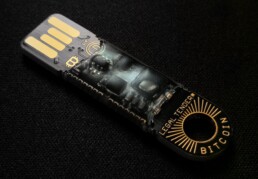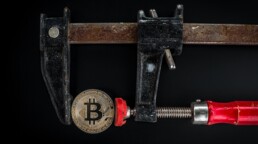Double Spending
Today we are going to learn what double spending is.
Double spending is the manipulation of the blockchain of any cryptocurrency in order to spend the same amount of coin several times, sending this coins to different addresses.
Let's take an example on the bitcoin blockchain.
If we have only one bitcoin on our wallet, and we send it to Marco, this will be awaiting confirmation in the network mempool.
Immediately after closing the transaction to Marco and before waiting for the confirmations, we will send the same amount to Giorgio, and this transaction will also end up in the unconfirmed transaction pool.
When these transactions are checked by the miners, the second transaction will be rejected as invalid and impossible to carry out.
In case of simultaneous sending of several transactions, we will have to wait for the 6 confirmations to understand which of the two transactions will be rejected and which will not
Bitcoin Digital Signatures
Today we explain the meaning of the term Digital Signature towards the bitcoin blockchain.
First, to send any amount of bitcoins to my wallet I have to prove that I am the owner of the private key.
Digital signatures will give you this proof of possession, obviously without making my private key public.
When I submit a transaction, it is mathematically mixed with my private key to create the digital signatures.
When the miners will go to validate my transaction, the digital signatures together with my public key will allow the miners to validate the transaction, guaranteeing possession of my bitcoins and avoiding double spending.
Digital signatures are different every time you sign a transaction, so they will be different for every send to any address.
51% Attack !
Today we understand the meaning of the term 51% attack.
Bitcoin miners in fact use their powerful computers to keep the bitcoin network alive by managing and processing all transactionslike checking that the users dont create any double spending trouble on the network.
This very important work, which guarantees the functioning and trust in bitcoin, is done by controlling the blockchain in its entirety.
To give an example, in the case of a transaction on the bitcoin blockchain from user A to B, the miners will check that the transaction is valid, that there are on the address of user A those bitcoins that he wants to move towards the address of user B.
If most miners certify the transaction as correct, then it will be confirmed and entered on the blockchain.
Now, if you had more than 50% of the computing power of the blockchain, it could theoretically be manipulated, carrying out double spending and other types of fraud such as preventing any transactions from specific addresses or eliminating other miners from the network.
The problem is real especially if the computational power of the blockchain is concentrated in the hands of a few connected and colluding hands. In this, the decentralization of mining should avoid this problem. If we think in the event that most of the computational power is in the hands of two or three large companies, the problem of dealing with a cartel is real.
Learn more about safety here.
5 golden rules to buy bitcoins between users!
the issue of the sale and purchase of bitcoin between individuals.
It may happen that you decide to sell or buy bitcoin from a private individual for various reasons, the important thing is to always be careful that on the other hand there isnt a scammer or an attacker on the seller.
Let's start from the point of view of those who want to buy.
The steps to take are:
1 checks the credibility of the seller:
There are groups and sites where individuals decide to sell their bitcoins.
On these sites there are always reviews and past experiences.
You have to check the credibility of these people and how they approach each other in the various chats.
Trust your instincts and Always start with small amount of money to buy.
Also try to use google by searching through the various pages. Maybe you will waste time or maybe you will save your money and life.
2 documents everything to avoid fraud:
Chat with this person, ask questions and have them explain precisely how the exchange will take place.
Don't leave anything out. Prefer emails or written chats, avoid phone calls or record them.
Remember that you need material to help you prove fraud.
3 wait for the first confirmation before paying
Remember that Bitcoin needs 6 confirmations to go from one address to another, and it generally takes 10 minutes for the transaction to be written in the first available block.
Obviously assuming that the transaction fee does not make him pass to the next one and so on ...
4 uses an escrow:
What is an escrow?
From wikipedia: A guarantee deposit is a legal agreement in which a real or virtual asset is deposited by one party in the account of a neutral third party, until the other party fulfills the contractual clauses. Upon fulfillment of the clauses, the agent will deliver the deposited asset to the other party.
A 3rd party will protect your money from possible fraud.
5 Where to trade:
You can choose to do the exchange in a public place, in a bar or without meeting the person on the other side.
It's all up to you, but don't put yourself in danger.
Avoid hidden places and stay around people.
Advice For those who want to sell:
The advice above can also be applied to the seller's part.
Be careful with buyers. It could be an attempted assault and it wouldn't be the first time a salesperson has been beaten up and robbed.
Be careful
Various types of Bitcoin wallets
Today we are going into details about the different types of wallets for Bitcoin.
As I have already told you, having a wallet where you can put your bitcoins is essential, it is one of the absolutely necessary steps to invest.
However, there are different types of wallets, all created accordingly to the needs of the owners.
The first diversification is between custodial and non-custodial wallet.
A custodial wallet is for example a wallet on an exchange, where you can use the wallet but you don't have control over it since you don't have the private keys.
Non-custodial wallets, on the other hand, are wallets that you can access via private keys and are in your full control.
This category is divided into hardware wallets and software wallets.
Let's start with the first type, namely the hardware wallets.
A hardware wallet is a physical wallet, practically a USB key that we can hold in our hands.
The most famous models are the Nano S or X and the Trezor.
These wallets are perfect for securing large amounts of coins and are fairly easy to use.
Another point in their favor is the vast support, in fact they allow you to have different types of coins saved inside them.
The safety of use is one of the fundamental points of this type of wallet, safety that you pay dearly given the purchase cost, based on the wallet model chosen, which is particularly high.
These wallets then need to use special software to work, such as Ledger Live for the Nano.
Let's move on to software wallets, which are a type of wallet that we can have on a device such as a phone or laptop.
One of the most popular wallets is electrum wallet, which is free and open source. It is a wallet dedicated only to bitcoins and we must say that it does not have a really nice user interface. But it works, is appreciated by users and is safe thanks to the fact that it is open source.
It also works with some hardware wallets.
Now let's talk about the wallet of hardcore Bitcoin professionist, let's talk about bitcoin core wallet.
Now let's understand, this wallet is specific only for people who know what they are doing since it downloads the entire bitcoin blockchain on their pc, and we are talking about gigabytes of memory.
This wallet is the ultimate in privacy and is obviously only for bitcoin and only for pc.
You will have complete autonomy and full possession of the tools of the bitcoin blockchain, so it is not for those who are just starting out. Even the interface doesn't help.
Now that you know what the various types of wallets for your bitcoins are, you just have to decide what to use in complete safety.
Learn more about safety here.
Being exposed in crypto consciously and knowing the dangers.
Why investing in cryptocurrencies? Why starting to study a whole new environment with a huge initial difficulty? Why endanger that part of our assets that we have decided to allocate in cryptocurrencies?
Because yes.
We start from the idea that the world of investments as a whole is huge, and that Blockchain is currently the most recent technology and with the greatest growth push on the planet. Investing in blockchain projects is within everyone's reach, so even less capable investors with little experience or just beginners can invest. Investors of this type are the ones who will make the biggest mistakes so they need to understand the various projects and decide if they are worth our money.
If you remember the dotcom bubble, you could have invested in amazon or google or other realities of the early internet era ... But we only remember those who survived and we forgot all those realities that had stratospheric growths in a few weeks, and then see your stock value crash to the downside and disappear from the market. But only from the market, not from the sad and shocked minds of their investors ...
Let's forget for a moment Bitcoin and Ethereum which are now the two champions of the crypto world, the universe of Blockchain projects is huge and varied.
It should be immediately understood that there are many projects that are or have turned out to be exclusively scams or clones of other more noble and serious projects, which with scammy name and various tricks have simply tried to drain funds from inattentive and inexperienced investors.
Currently over 90 percent of blockchain projects launched and funded have failed, most without writing a single line of code. Aware of this, and also aware of the fact that the Blockchain is the future and it is time to be inside it, as investors we must ask ourselves some simple and basic questions to understand where to put our funds.
Let's start with the first doubt to be eliminated, if the project we are evaluating creates a product or service that solves a real problem and if this is in line with Blockchain technology. Not all projects showed off as crypto friendly are suitable for the Blockchain. In case it is really suitable, and perhaps thanks to the blockchain it solves an unsolvable problem, well we have taken a big step forward. Those who do not respect this rule can be eliminated in a long-term investment perspective.
After that we will have to understand if the evaluated product really exists or is still under development or worse, it is only on paper and not even explained in a perfectly understandable way. In fact, a product under development takes months if not years to be launched on the market, extending the time for the return of the investment and therefore enormously increasing the risks for the investor.
After the product, the team should be checked. It is clear that the team must reflect experience in the sector to which the project belongs and the individual members must be experienced and competent, with a good curriculum. The team will then have to try to create partnerships with various companies already on the market. Experience, partnership and reputation are excellent indicators.
Another aspect to check is the type of token created to finance the project and offered to the public. There are utility tokens that offer a service linked to the project and whose value changes according to company and market trends. Otherwise, security tokens can be offered, which are backed by real company assets. These tokens are regulated and, in addition to offering an extra guarantee on the project, they carry rights on assets owned by the company.
Another point to check for the investor is the control of who issues the token, whether through an exchange or directly by the company in charge of the project. In the case of little-known exchanges with an unclear past, here is an alarm bell.
And this point makes us shift our attention to the dangers of investing in cryptocurrencies. Danger seen as the possibility of losing all our accumulated value.
First of all we need to define and differentiate the types of risks we run by investing in crypto.
We have two main type of risk, which are technical risk and financial risk.
When we talk about technical risk, we mean any problems we may have with wallets, exchanges and other technological issues.
The wallet is your property and it is your responsibility to manage it in the best possible way. One of the things that you cannot predict, however, is a possible bug that cause to hack the wallet and make you lose your funds. For this reason, the best choice to always make is to look for and use only the most successful wallets created by companies that invest a lot in security for their products. This choice is yours and it is your responsibility.
The same goes for the choice of the exchange on which to operate. An exchange can be attacked and its wallets can be hit and looted. But a large exchange has the funds and a strong need to protect itself, so it will always be state of the art in protecting its business and consequently its users. On the other hand, small exchanges do not always have these capabilities and are much more risky. The risk you take, however, can be rewarded since small exchanges often have coins that are not present on the larger ones and the movements can be more violent and faster, making you gain or lose more.
Leaving your coins on an exchange is a big risk. Remember that the coin that is on your wallet on the exchange is in the wallet of an exchange and not on your proprietary wallet. If something should happen to the exchange, you are almost certain that you have lost your parked coins waiting to be traded. In my experience it is better to spend something on movements from and outside your wallet. You run the same risk when you borrow your coins on an exchange that gives you this option. In this case, however, the risk is greater since your coins will be blocked for the entire time of the loan, not allowing you to quickly exit the exchange for whatever reason you want. It should also be considered that exchanges do not always allow immediate exits since the general timing is between 12 and 24 hours.
Scams are a full-blown reality of this world, we have made an article with the list of the most famous so we can teach you how to defend yourself. Learn more about Scam here.
Another problem you may find is the technological protection of the coins. Coins like Bitcoin and ethereum are difficult to attack, the development teams are very large and made up of capable programmers with very large budgets. On the contrary, coins just put on the market and therefore small and with few developers could have bugs that undermine their intrinsic safety. Choosing the coin to invest in is your responsibility, you take a risk in any case but it is a risk that you can manage.
Therefore the risk is reduced by using high quality wallets, exchanges of proven trust and coins among the most liquid. If you use the right things in the right way you have lowered the problematic risk.
Now let's face the financial risk.
The major problem encountered in the crypto market is the extreme volatility of prices, given by a combination of low market liquidity, thin books and a strong presence of whales that can move the market. However, this volatility is the key to making money. If we position ourselves in the right trend, our coin will obviously have a growth that is impossible on conventional markets.
But be careful, there are no guarantees regarding the growth of the price of a coin. It is not acceptable to buy something at random and abandon it, and then hope that in the following months or years it will increase in price.
The same goes for the underlying of each coin. The underlying of each coin is the development and use technology that it has in the real economy. If this technology is useless, wrong or totally non-existent, it is obvious that the value could collapse and reach zero.
There are Ponzi schemes like OneCoin which have no underlying and which are based only on the trust placed in them. When confidence collapses, OneCoin is like a fake baseball card. I only mentioned OneCoin for the trust issue, OneCoin is not a cryptocurrency.
Bitcoin has value because people believe in this technology and believe in the monetary design philosophy that underlies it. Bitcoin is also valuable because it is used according to its philosophy. The use of a coin, like the trust that the public has in it, creates value on the market.
There are some basic things that you must always remember.
By investing in anything, you are taking a risk. Risk that you can lower but never eliminate. Balance the risk on your profile, never overshoot it. Every mistake is always paid with your money.
In the long run there are no certainties about the value, while someone more famous and better than me said that in the long run we are all dead.
The risk of losing and zeroing your trading account is as real in crypto currencies as on any financial instrument. On crypto and derivatives, obviously all this can happen very quickly.
Anyone who promises you fast, safe and risk-free earnings is lying and wants to scam you. Say goodbye to this fool.
Security and personal hardware
With the use of digital assets in the blockchain sector, it is good to start with an analysis of your computer and smartphone, and their safety. It is good practice to always have the operating system updated to the latest security patches, and consequently all the programs installed on the PC. The use of the latest generation paid antivirus is essential. Let's destroy a myth, there is no best antivirus but good antivirus (do your research and buy a license). We reiterate the importance of having a good antivirus as many malware are designed to steal data relating to cryptocurrencies (your assets).
It is also not recommended to connect to public wifi connections, it is better to use your own data connections, and to implement the use of vpn (virtual private network) to secure your connections. There are many very affordable subscription plans.
It is essential to have a back up of your private keys and passwords off line, not on the computer in use, as if you were to fall victim to the notorious cryptolocker, we will lose all data (all the contents of the pc will be encrypted), and to obtain the key we will be forced to pay cybercriminals in bitcoin. So, watch out for email scams. Never open an attachment if you are unsure of the sender.
When using a smartphones we highly recommend an antivirus / antimalware updated to the latest definitions. The VPN contract certainly provides for use on multiple devices, so we are going to take advantage of the usual subscription also on smartphones.
If you also use your smartphone for work, for leisure (social, chat of various kinds, entertainment for adults), you will create a promiscuity with the operations in the field of cryptocurrencies, so it could be optimal to use a dedicated smartphone . For those who are obsessed with security, we can also indicate a specific smartphone, the htc Exodus created to ensure maximum security in the context of the blockchain.
Small but fundamental mention of the use of 2FA (two factor authenticator) for access to the various exchanges, in order to make operability with your own cryptocurrencies even more secure.
Learn more about safety here.
Save your bitcoins - Security Rules
Safety first. With crypto, this is imperative.
Lets start from a very important premise. Bitcoin is currently considered a safe system.
The weak point in the use of bitcoin is the user.
the weak point is you.
But this big problem can be solved with careful planning and habits every time you use bitcoin.
Losing your bitcoins means losing access to the wallets where they are stored or sending them to people or exchanges from which we can no longer recover them. Another example of a loss could be considered the theft of the wallet by a criminal.
Always remember that there is no way to delete a transaction on the blockchain, and those Bitcoins sent cannot come back. There is no regulatory autorithy that will protect you from malicious people and get your bitcoins back. Is only your responsibility to protect yourself
But what are the steps to protect yourself.
First of all, a wallet must be created, and this wallet will have a private key. This private key must be keep secret and you must back it up
If you don't know what kind of wallet to open, check out our article on the various types of wallets.
To access this wallet, create a login password. Back up your login password.
Remember that you are not in control of wallets on exchanges, so do not forget funds on exchange unless you are trading. Exchanges are like banks, they own your money but control is in their hands.
For large quantities of bitcoins, it is imperative to use hardware wallets
Make a copy of the wallet's private key and password on a USB stick. Encrypt this key and hide it in a safe place. You can choose to have multiple keys with multiple passwords for the different wallets you are going to create. Obviously you don't have to forget the password otherwise you will lose everything.
Create one or more strong passwords,it means that you have to create password with at least 8 characters, better if there are more. With a mixture of lowercase and uppercase letters, numbers and special characters.
Do not use passwords from other accounts such as email.
A good idea for a password is a sentence made with one or more grammatical errors, or by substituting letters with numbers such as 5 instead of S
the best possible password, however, is a string of characters and numbers and random symbols but it is difficult if not impossible to remember
You can also use a password manager to generate and track passwords
Some hardware wallets require you to use Pin codes, always prefer 8-digit ones over 4-digit ones and don't use dates of birth.
When accessing exchanges, always try to use 2-factor authentication and not SMS. You can check out our 2-Factor Authentication video to learn more. SMS is not recommended because it could be intercepted by a hacker and used to defraud you or empty your wallet.
If you need to access an exchange or your wallet, it is absolutely not recommended to use a public wi fi. Wait until you have a secure line or use a VPN. Much better never to use public wifi.
You have to pay attention to the sites you use and check the emails that come to you. Phising sites and emails are a real threat.
check that you have a secure SSL connection via HTTPS. There are many scams with cloned sites and domains that look the same but that if carefully observed have very small discrepancies from the originals
Another precaution is not to click on the links within the unsecured emails. We can receive emails from the exchanges where we are registered but we must check carefully and if the email seems suspicious, throw it. Obviously never open attachments from these emails. Remember that an exchange email should contain your name, not just Sir or Dear Customer. Another test is to check the real origin of the email.
remember that transactions cannot be canceled or returned.
Precisely for this reason when you send money always check the sending address twice and never write the address manually,
because you will face always complicated address, and if you make a mistake and send money to an address that has nothing to do with it and you never get those coin back.
The security of your Bitcoins is entirely up to you.
Step 3 - Wallets
In this article we're going to talk about cryptocurrencies wallets. We will face all types of wallet to discover this super important tool of the crypto world.
The wallet is the tool to use to interact with a blockchain.
Wallets can be divided into software, hardware and paper wallets. These can be considered Hot or cold wallets.
Let's start by saying that most wallets are of the software type because they are more practical to use than the others. However, hardware wallets are the safest option, while paper wallets are now an outdated option. But let's see how it works.
Any wallet allows you to interact with the Blockchain, creating the information necessary to create transactions, receive and send the crypto currencies compatible with the wallet. The wallet does not "physically" contain the coins, but rather the public and private keys to operate on the blockchain and the public address that is created based on public and private keys.
The address is a specific point on the blockchain from which to receive and send coins. Coins never leave the Blockchain but simply change their address.
For this reason, you now understand why the private keys of the wallet should never be revealed. In fact, the private key is the only way to access your coins. In case of a possible loss of your mobile phone, you will be able to access your wallet again with the private key.
Now let's face the difference between cold and hot Wallet. In fact, wallets can operate in a different way.
A hot wallet is any wallet connected to the Internet. When you create any exchange account and transfer coins from your wallet to the address assigned on that exchange, you are transferring funds to the exchange's hot wallet, so that your funds are immediately available for trading.
Cold wallets have no Internet connection, so they are safer from cyber attacks and better set up to store coins over the long term.
Now let's see the different types of wallets and which is the best compromise of use.
Let's start with the Software wallets, there are of all types and characteristics, and specific by currency. Obviously, the vast majority are connected to the internet, so they are hot wallets. Software wallets are divided into web, desktop and mobile wallets.
Web Wallet
With a web wallet, you can access the blockchain with a browser interface without having to download or install anything. The most classic example is the wallet of any exchange.
You create a new wallet and set a password to access it. In the case of an exchange wallet there is no private key, you are entrusting your funds to another person, in this case the exchange
Desktop Wallet
The desktop wallet is software that you download and use on your computer.
A desktop wallets give you full control over your keys and funds.
When the desktop wallet is created, in most cases a file called "wallet.dat" is created and stored locally on your computer. This file contains the private key information used to access your addresses, so it must be protected. Remember that if you delete it or lose your computer and don't have a backup, you lose all the funds on the wallet.
A good solution is to export the private key or seed phrase corresponding to your newly created wallet, so that it can also be used on other devices at a later time. Since the wallet is on your PC, it must be protected from malware or viruses.
Mobile Wallets
Mobile wallets are a very similar alternative to desktop wallets but designed for smartphones. They are the most practical wallets for everyday use as they allow you to send and receive crypto by scanning QR codes. The problem of viruses and malware is also present here, so you need to protect your device. In addition, given the daily use of the smartphone, it is necessary to have all the back up of the wallet for any recovery following theft or loss.
Hardware Wallets
Hardware wallets are physical electronic devices, not connected to the network except for their use. They generate random numbers to create public and private keys that are stored within them. Their intrinsic greater safety, however, is balanced by a less simple and quick use.
Hardware wallets are used in case you want to keep large amounts of crypto for a long time. The access PIN must always be set and the recovery phrase saved as in web wallets.
Paper Wallet
the paper wallet is a piece of paper on which a public address and its private key are physically printed via QR codes. Code scanning allows you to perform cryptocurrency transactions. This kind of wallet can be considered a good alternative to long-term crypto storage, given its resistance to online attacks.
The biggest problem lies in the fact in order to use the paper wallet, the total amount of crypto currencies in it must be moved.
If we have a 15 Bitcoin wallet and we only have to move 3 of them, we will first have to make an intermediate step to another address where you will send all 15 bitcoins, and then from there send the 3 you need. The remaining 12 will then have to be put back safely on another paper wallet
Remember that your paper wallet will be empty after its first outgoing transaction. So don't hope you can use it again later.
As we have already repeated, it is essential for each wallet to have the back up and the seed phrase to recover their wallet in case of problems.
Learn more about safety about your Coin here.
Smart Contract
What are smart contracts? Why should we care? How can they improve our future life and why do we need to get to know them?
A smart contract is technically a digital contract designed to solve the problem of trust between two parties.
A set of lines of code indissolubly linked to the blockchain with characteristics comparable to those of a real contract.
The smart contract eliminates the third party that acts as guarantor within a transaction and thanks to the technology it allows actions to be carried out upon the occurrence of one or more conditions envisaged within the smart contract itself.
Smart contracts are distributed on the Blockchain and are immutable over time. Once deploied (i.e. written and integrated with the blockchain) it cannot be modified, nor can smart contracts be created that have a temporary duration
The fields of application and uses that can be made of smart contracts are very wide.
For example, they range from banking, postal and insurance, sharing of movable or immovable property. Any situation that requires a contract could be the protagonist of a smart contract. But be careful, being unmodifiable, they lend themselves specifically to being a source of scams or malicious backdoors.
Ethereum is currently the preferred Blockchain for creating smart contracts using the proprietary solidity language.











